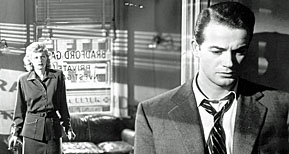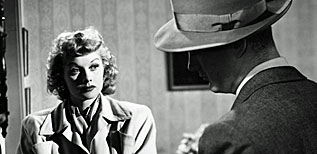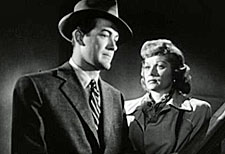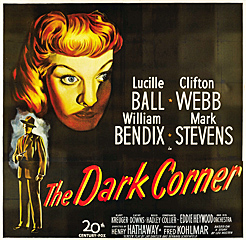Mon 12 Dec 2016
THE DARK CORNER. 20th Century Fox, 1946. Lucille Ball, Clifton Webb, William Bendix, Mark Stevens, Kurt Kreuger, Cathy Downs, Reed Hadley. Screenplay: Jay Dratler & Bernard Schoenfeld, based on a story by Leo Rosten. Director: Henry Hathaway.

This is one of those movies that whenever I watch it again, I see things in it that I hadn’t noticed the first time. That may be true of many good films, but for me, it’s especially true for noir films, which this most definitely is.
Mark Stevens plays PI Brad Galt, who’s trying to pick up the pieces in New York City after having had a plague of bad luck (and a jail term) out in California. But when you’re down, sometimes it seems that the rest of the world just wants to pile on. Only his new secretary, played to perfection by Lucille Ball, seems to care, and she’s the one who tells him that he’s being followed by a thuggish man in a white suit (William Bendix), posing as a down-at-the-heels private eye.

I say “posing,” but even if he really is a PI, it’s soon clear enough that it’s a setup. Details need not be gone into, but it may suffice to say that at the other end of Manhattan society — the world of high society and culture — is an art dealer (Clifon Webb) who is having problems with his wife, and he thinks he can get the unwitting Brad Galt to help him take care of it.
&nbsrp;It’s a complicated plot, and it takes all of the movie’s 99 minute running time to get everything established solidly enough that events can take their natural course. Galt is being set up, he knows it, but he has no clue who’s behind it, or why.

Only the mother hen approach of his faithful secretary can keep him focused on avoiding the frame-up he’s all but wrapped up in. There’s no nonsense about it, either. She makes that clear enough right away.
So there are elements of Cornell Woolrich’s Phantom Lady in this story, with even stronger overtones of Laura, though I don’t believe I can persuade you that this film is better than either. Nonetheless, it is very good, and so are the players, especially the beautifully sassy but still innocent Lucille Ball, whom one wishes had had the opportunity to appear in more noir films as good as this one.
PS: What I was able to take the time to notice during this most recent viewing was the camerawork and black-and-white photography of Joseph MacDonald (Call Northside 777, Pickup on South Street). Superb! Next time you watch this film, see if you don’t agree.

December 12th, 2016 at 7:50 am
This is one of my favorite film noirs and I remember it having some nice wisecracks. Clifton Webb is good as always and it shows the good influence of LAURA.
December 12th, 2016 at 10:44 am
To me, this one is second only to LAURA. The plot structure is noteworthy: It gets almost to the end of the movie and the only one who doesn’t seem to see the whole picture is Brad Galt himself (we in the audience already have a good idea of what’s going on); the final pieces fall into place for him in the last confrontation scene in the art gallery.
December 12th, 2016 at 12:51 pm
This was on late, late night last weekend out here and I watched the scene when Bendix gets beat up by Galt while Ball is out in the car waiting for Bendix. But then I had to go to sleep. [If it hadn’t been 2 AM I think I would’ve watched the whole thing through. Enduring the horrendous commercials at that hour on TV — mostly gadgets selling for $19.99 and sex phone lines — is torture to me.] Anyway… Excellent dialogue in that scene. And you see Stevens as one of the most broken men in all of private eye movies. I’ve seen the movie so many times I’ve lost count. Was spellbound by it ever since the first time I saw it (on TV of course, probably on a Saturday afternoon) when I was 14 or 15 years old. I used to talk about THE DARK CORNER all the time to my college “movieholic” friends who had never seen it nor heard of it. I was overjoyed when in talking about our favorite old movies in the dressing room at a summer stock company I finally found a guy who knew the movie!
I agree with Mike. A real underrated classic.
December 12th, 2016 at 11:18 pm
One of my favorites. Simply a great film.
What I don’t know is why the Leo Rosten book has never been reprinted, published as Leo Ross I think.
December 13th, 2016 at 12:32 am
I think the biggest challenge this film has in being seriously discussed among critics and film noir fans is Lucille Ball. It is hard to think of her as a dramatic actress so most past this underrated classic by. More the pity because this is one of Ball’s best performances.
Ball is not one of my favorites so I was really surprised by how good she was in DARK CORNER.
December 13th, 2016 at 2:43 am
Michael
I think you’ve just hit a nail on its very head.
December 13th, 2016 at 12:56 am
As near as I can figure, The Dark Corner wasn’t a book – at least not a standalone novel.
In those days, Leo Rosten was writing short stories, using the pseudonym ‘Leonard Q. Ross’, for magazines.
Many of those stories were sold to movie studios for use in second features; I’ve read (haven’t confirmed yet) that Rosten might have converted his stories into film treatments for specific studios.
I also can’t find out whether any of Rosten’s short stories were collected in book form (as the Hyman Kaplan stories were, under the ‘Ross’ pen name); if they were, someone please let us know.
December 13th, 2016 at 2:43 am
According to the AFI Catalog, the movie was based on the serial story “The Dark Corner” by Leo Rosten in Good Housekeeping (July-Aug 1945). This is all I’ve found so far. It’s too late tonight to double-check this, nor to do any other research on Rosten. It’s been a long day!
December 13th, 2016 at 2:58 am
I thought I’d checked Hubin earlier today, but obviously not, since here it is, in book form. I hope I have this sorted out correctly:
The Dark Corner. Century, pb, 1946, as by Leonard Q. Ross. Reprinted by Edwards, UK, hc, 1946, as by Leo Rosten.
December 13th, 2016 at 4:54 am
I believe Century did a lot of movie tie-ins and novelizations; this could be be of those and not an original novel. ANYBODY EVER READ IT?
December 13th, 2016 at 7:48 am
I’ve read that this is a novelization. There are a couple copies for sale on abebooks but both are high priced.
December 13th, 2016 at 9:21 am
Here’s what the cover looks like:
December 13th, 2016 at 9:27 am
I believe the term “novelization” is technically incorrect, if the story appeared in magazine form the year before the movie came out. It was a paperback original, however, and as Walker says, it is not easy to find. I may once have seen a copy, but I’m not sure about that. I do know, however, that I do not own one.
December 13th, 2016 at 10:28 am
This is not a novelization of the movie. It is a movie tie-in edition that reprints the source material that was the basis of the movie. Century Books did this at least three times, while occasionally doing actual novelizations as well. This book is a bit short (126 pages in digest format) which may explain why it hasn’t had any other separate publication.
December 13th, 2016 at 11:02 am
Century (as Ken mentions) also published SLEEP MY LOVE, as by Leonard Q. Ross, (Century 66, 1947) as a movie tie-in. The movie, appearing in early 1948, starred Robert Cummings and Claudette Colbert. The movie was directed by Douglas Sirk (Detlaf Sierck), a refugee from Nazi Germany who also directed Lucille Ball in LURED (1947), a noirish serial killer story where Lucy goes undercover to flush the killer. Quite good with George Sanders, Boris Karloff, Charles Coburn and Cedric Hardwicke.
December 13th, 2016 at 11:26 am
Lucille Ball, contrary to the view expressed earlier, appeared in a wide range of films, many of which, certainly during her RKO period, were conventional leading ladies, including Dance Girl Dance, Five Came Back, and Lured as above. The Dark Corner has the lead actor billed fourth, right where he belongs. With Dana Andrews, or John Payne, the film fares far better, but Stevens, whatever his gifts, was a conventional leading man who did not break the sound barrier.
December 13th, 2016 at 2:38 pm
I”m glad you brought up Mark Stevens, Barry, especially since I agree with you. Compared to the star power displayed by the other players in this movie, he really did fall into fourth place.
On the other hand, I’ve seen him in this role often enough that I can’t see anyone else taking his place, even someone of the caliber of a Dana Andrews or John Payne. To me he manages to fit the part, and I can’t exactly say why, except that he does.
December 13th, 2016 at 6:32 pm
Yes Barry, Lucille Ball did indeed play a variety of parts early on. But those of us who grew up watching her as “Lucy” find it had to disassociate her from that when we see her in a “straight” part. I’m beginning to have the same trouble with Leslie Nielsen.
July 14th, 2023 at 12:18 pm
Dan,
Responding after the space of seven years, I agree re: Leslie Nielsen. There’s an outtake of him auditioning for the part of Messala Severus in Ben Hur. It’s hilarious.